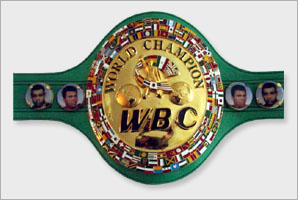One of the axioms of modern boxing is that the sport is plagued by too many world titles, devaluing the four major belts (IBF, WBA, WBC and WBO) and making it nearly impossible for the general sports fan to follow the sport. However, another effect of the heavily fragmented world title scene is the rise of the fake championship career.
 Back in the days when it was just the WBC and WBA, or even after the IBF joined the crowd, the fake career was impossible. A journeyman or fringe contender might have been able to step into a vacuum and seize a title for a short time, but their reigns were always short because there was always a world class fighter ready to step into the breach and take that title away from them. Once the WBO entered the picture, however, there were enough major titles that a man could grab a belt, fight at home and avoid any serious challenge, and keep that belt for years. The result is a career that looks great on paper and might even include record-breaking achievements, but was wholly engineered and utterly fake.
Back in the days when it was just the WBC and WBA, or even after the IBF joined the crowd, the fake career was impossible. A journeyman or fringe contender might have been able to step into a vacuum and seize a title for a short time, but their reigns were always short because there was always a world class fighter ready to step into the breach and take that title away from them. Once the WBO entered the picture, however, there were enough major titles that a man could grab a belt, fight at home and avoid any serious challenge, and keep that belt for years. The result is a career that looks great on paper and might even include record-breaking achievements, but was wholly engineered and utterly fake.
The Danish Pastry
In my mind, the prototype of the fake championship career was that of Danish heavyweight Brian Nielsen. The Danish Pastry never held one of the big belts, but he did hold the IBO belt. Proponents of the IBO and its computerized rankings system should remember that the unworthy Nielsen was their poster boy through the mid-to-late 1990s. The Dane built his undefeated championship record by beating a succession of washed up, aged fighters from the 1980s, such as Carlos de Leon, James “Bonecrusher” Smith and Tony Tubbs, mixed in with meaningless fringe contenders such as Crawford Grimsley and sideshow figures like Peter McNeely. Nielsen was just barely able to beat a 48 year old Larry Holmes, if that tells you anything.
By the time Nielsen finally lost a fight, he was 49-0. Technically speaking, that means Nielsen could have eclipsed Rocky Marciano’s record of retiring as a 48-0, undefeated champion simply by retiring at the right time. Of course, no one accepts Nielsen’s claim to have been a real world heavyweight champion just because he held the IBO belt, and no one takes his career seriously as he has never fought a real contender. Still, what if Nielsen had gotten his hands on a major belt?
The Phantom Robberies
In many ways, Nielsen paved the way for Germany’s great pugilistic non-entity, Sven Ottke. “The Phantom” won the IBF Super Middleweight Championship when he lured Charles “The Hatchet” Brewer away from Philadelphia and into Germany. Brewer is a classic example of a man who filled a vacuum, since he was at best a fringe contender who stepped into the gap left by Roy Jones’s move to light heavyweight. Helped by some truly crooked German judging, Ottke won a debatable decision of the sort that would become the signature of Ottke’s entire career.
Ottke won some notable fights legitimately. He knocked out Giovanni Nardiello and Anthony Mundine and legitimately beat a (by then much older) Thomas Tate in a rematch. Most of his fights, however, stank to the rafters. Ottke could have dropped decision losses to Brewer, Tate and Glen Johnson, and Robin Reid probably would have knocked him out had it not been for the most obviously corrupt refereeing in modern times. Ottke’s career contributed greatly to Germany’s awful reputation for corrupt boxing officiating.
Sven Ottke retired as the IBF champion with a 33-0 record and 21 title defenses under his belt. Technically, that puts him in the rarefied 20+ title defense club, along with past greats like Joe Louis or contemporaries such as Joe Calzaghe and Bernard Hopkins. Yet clearly the only reason Ottke got as far as he did was that he never fought outside of Germany, and was thus shielded by rigged judging and biased referees.
The Damage of Fakery
No one takes Ottke’s or Nielsen’s claims to greatness seriously, and I strongly doubt either man will ever be invited to a Hall of Fame induction. However, that does not mean that such obvious career fakery does not occasionally get some traction. Some of the Wikipedia entries dealing with boxers who enjoy records of 20 or more title defenses mention Ottke, but without explaining the context and problems with Ottke’s record. That in and of itself says that at least one person who spends a great deal of time editing boxing entries on Wikipedia doesn’t know who Ottke is and why his record is suspect.
The Wikipedia issue underscores the very real historical problem posed by fake championship careers. Whether we like it or not, fake accomplishments wind up on sources like boxrec.com with no notations as to how they were achieved. If you didn’t know Ottke’s career blackened Germany’s reputation for fair play or took the IBO belt seriously because you saw it around the waists of some serious champions, you might think Nielsen and Ottke were the real thing. Right now, there are plenty of boxing fans around who know better, but that won’t always be the case. I shudder to think that one day someone might look at the paper records and think Sven Ottke was as great as Joe Calzaghe and Bernard Hopkins, yet somehow neglected and ignored because he only fought in Germany.










